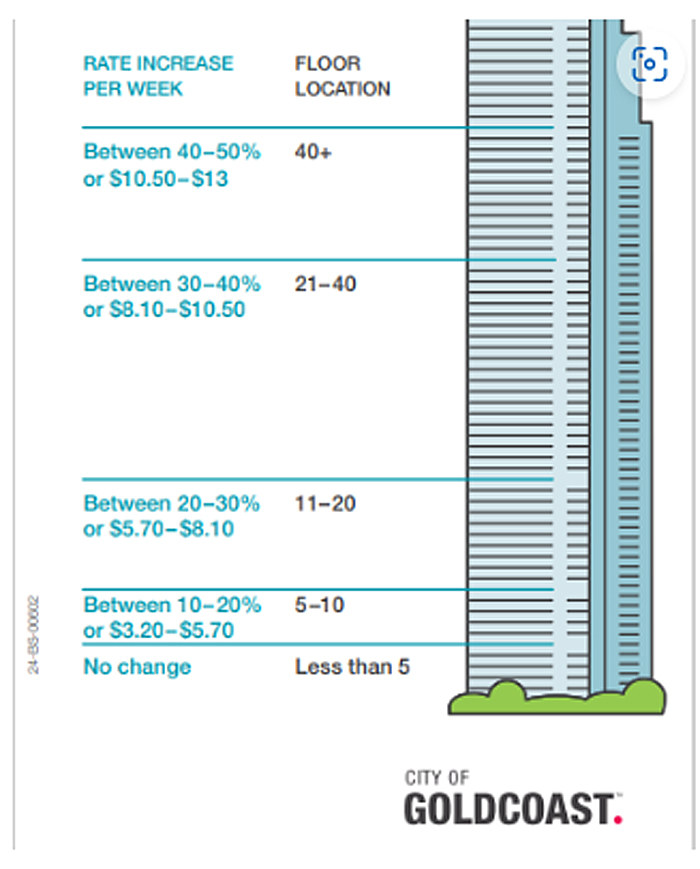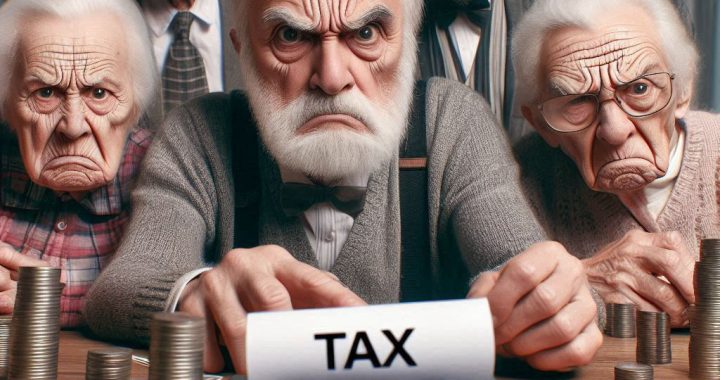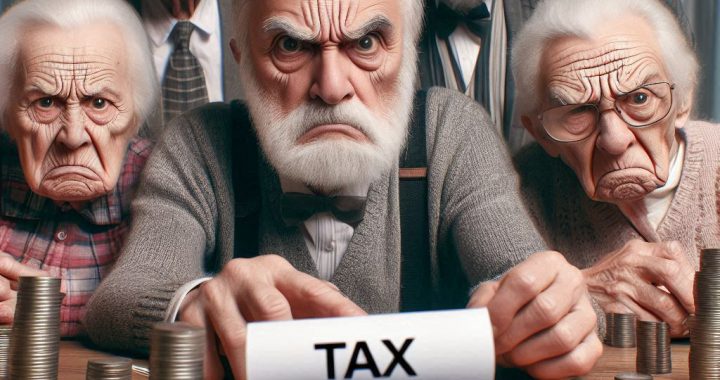Owners slugged up to 50% more in rates from View Tax.
Monthly Archives: August 2024
Gold Coast Council slugs owners with a new ‘view tax’
We residents of a Gold Coast highrise are now subject to the new high rise apartment tax which means an increase of council rates of up to 50 percent.
The rationale is that higher floors and penthouses are full of well healed types lying on their banana lounges, half asleep and dreaming of how they intend spending their spare loot. Let’s tax these rich, idle dudes, the council seems to be saying.

The reality is that many Gold Coast high-rises are owned by seniors and pensioners and they are rented by migrants and students attending any of the three local university campuses and TAFE.
It’s odds on that investor owners will simply pass on the rate increases to them and renters will be slugged again.
The council argues that it’s unfair that an apartment on the top floor with a sensational view is rated the same as an identical apartment on the ground floor. It argues that the top floor apartment is worth more money, so it should incur higher rates.
However, some apartment owners on high floors may have a lousy view. They may overlook an industrial estate or a busy highway or be situated next to another high rise where their view is someone’s kitchen or lounge.
Those apartments will be slugged the same surcharge as other apartments on the same floor, but their apartment is worth less due to their lousy view.
We could quite granular about this. What about different rates for different views? Is a view of the ocean worthy of being taxed more than one of the Gold Coast hinterland? What if one apartment enjoys a 180-degree panorama, and another just a 10 percent view? What if you face east and enjoy beautiful sunrises? Should you pay more? Maybe a different rate for facing south and facing north (more sunny days) because it attracts more prospective purchasers and a higher price?
In the end, this “view tax” is as arbitrary as the “window tax” introduced by William III in England and Wales in 1696, and by Napoleon Bonaparte in France and the annexed Netherlands in the early 1800s, as a massive revenue raising measure for his wars.
The window tax applied to the area of windows and, in some instances, the number of doors in your home. But it began to be abolished in the 1850s when people were getting ill due to poor ventilation in mouldy houses with their windows boarded up to avoid the tax.
Yes, some legislators were wiser then than now. Sadly, 170 years later, some bright spark has seen value returning to a discriminatory tax that’s not unlike that window tax. Instead of being taxed for what you look through, you are taxed for what you look at.
The council should reconsider this as a half-baked idea.
We’ve been spending big on a never ending legal battle
A long-running legal battle between Southport Central’s residential and commercial body corporates have cost residents dearly.
Our complex shares the Southport Central site with ‘Commercial’, three retail body corporates, and the Australia Fair western carpark.
Newsletter 12 published by the Committee on 14 August 2019, described the circumstances concerning the apportionment of expenses of running the Southport Central site which led to a dispute between the Commercial and Residential body corporates.
Commercial commenced legal proceedings against Residential after Residential refused to pay an amount that Commercial says was owed as part of a cost sharing arrangement,
Newsletter 12 said: “it is clear that around $4,000,000 is owed to Residential” and that the committee “will endeavour to keep owners updated and believe this process will result in a significant reduction in levies”.
Unfortunately, there were minimal efforts to keep owners updated.
In response to an owner’s question at the 8 June 2022 committee meeting question and answer session, a committee member told the 16 owners present that the legal claim by Commercial against Residential had ‘settled’ – neither party would pay anything to the other and that both parties would bear their own legal costs.
That advice was disputed by Mr Colin Buckley, the former chairperson, whom those present and the minutes confirm had been engaged by the committee as a consultant. The settlement issue has never been further addressed by the committee.
Committee minutes of 23 October 2023 (Voting Outside of Committee Meeting – or VOCM), said: “The matter remains unresolved and is essentially unchanged from what is described in Newsletter No 12”.
Ahead of the 25 March 2024 committee meeting, it was put to the committee:
That concluding (VOCM) statement is not true in that the Residential counterclaim was, in March 2021, reduced to $545,962.34 (a long way from the $4 million counterclaim mentioned in Newsletter 12) and implies that the proceedings are continuing, whereas there has been no progress in this proceeding for over three years and if the committee intends to advance the matter, it must first obtain an order from the court – which can be expected to incur significant legal costs.
QUESTIONS:
Why has no action been taken to advance or finalise this matter?
What are the intentions of the Committee?
The Chairman avoided addressing the above questions, saying only that the committee would “follow the legal advice it receives”.
The 10 June 2024 committee meeting minutes said in relation to item 6.1 legal claim by Commercial:
“We refer owners to committee newsletter no 12 sent to all owners on 14 August 2019 which is available in English and Chinese for downloading from the online community portal. Newsletter No 12 gives the background of the matter. Requests by Residential to Commercial to cease the legal action and resolve the issues by discussion have not been successful. The matter remains unresolved and is essentially unchanged from what is described in Newsletter No 12.
What can be concluded from the above is that the repeated advice to owners that the matter is ‘essentially unchanged from what is described in Newsletter No 12’ is false; and that owners have been intentionally misled by committees since March 2021
There is more to be said regarding this matter.
In the Queensland court system, where there has been no action in a court matter for a period of two (2) years, the matter is said to have gone “stale” and a party wishing to proceed further, must first obtain an order from the Court – at a cost. Costs to date, including those paid to Herdlaw, a barrister and a Queens (now Kings) Counsel are estimated to be in excess of $150,000, but the committee needs to clarify this!
This article does not dispute the committee decision to oppose the Commercial application, the original Residential counterclaim or the amended counterclaim, it does question why the committee has intentionally misled owners, leading us to believe that there was a prospect of recovering up to $4 million, notwithstanding the amount of the counter claim was reduced in March 2021 to $545,962.34.
Transparency in body corporate administrative and financial management should concern every owner.


